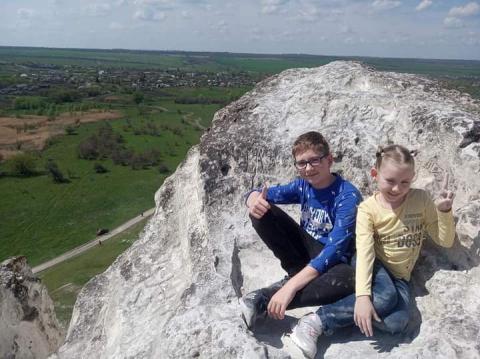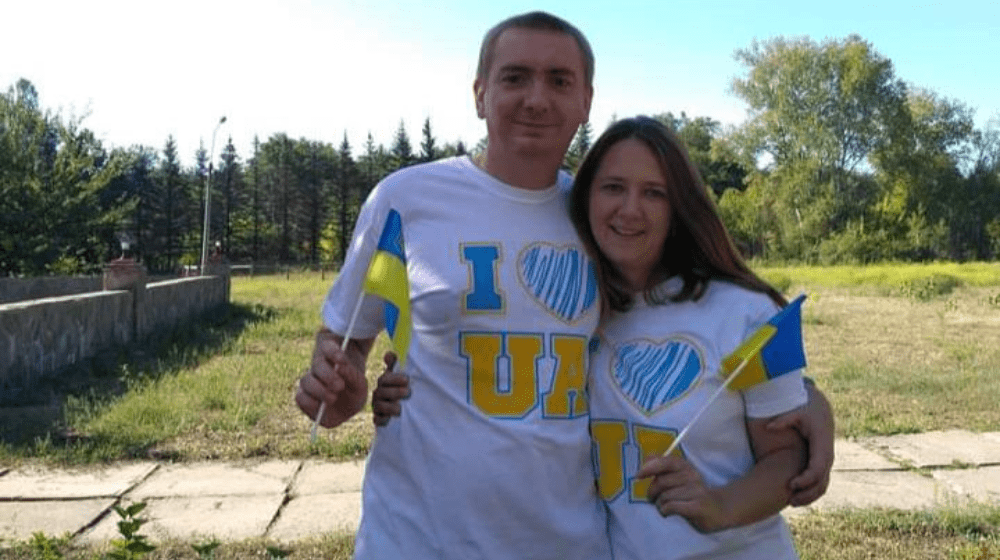Oleksandr lives in Kramatorsk, Donetsk Oblast, and works as a volunteer with TatoHub. He has a wife and two children – the older Mykhailo and the younger Mariya. Until February 24, Oleksandr worked as an individual entrepreneur dealing with accounting applications, headed a condominium association, coordinated the "Active Community" PO in Kramatorsk, Slovyansk and Mykolayivka in Donetsk Oblast, conducted events and training seminars for people. And in his spare time he grew cactuses on the balcony. But after the full-scale Russian invasion to Ukraine, he had to wrap up some of those activities.
— I planned to find a permanent job with TatoHub, but it turned out to be a volunteer engagement, — says Oleksandr. — They needed an administrator of events, and I had an interview appointed for February 27. Now they have a need for humanitarian support and this is what I do.

Oleksandr remembers how frightening February 24 was. On the first day, as the condominium association head, he attended numerous meetings with the city authorities. What to do with the house intercom systems, what to do about shelters and house lifts, how to alert people? There was no panic, just urgent issues that had to be resolved.
— The city suffered some shelling. We spent most of the time in the hallway with the children, who kept crying. We did not go bomb shelters because we understood that the real bomb shelters were not easy to find, and the prefab house basements were a trap. Therefore, we used the “two-walls” rule. It was very difficult. Even more so as my son remembered the events of 2014, when his school in Kramatorsk was bombed. That was the time when he was about to go to school as a first-grader, and those explosions left a mark in his memory.
His son Mykhailo is now 13 years old, and his daughter Maria is nine. In early March, together with their mother, they fled from Kramatorsk. At first, they were not sure about leaving. The wife also hesitated a lot, but the family did not want Mykhailo to go through the 2014 trauma yet another time, and even more so, they did not want anything bad to happen to the younger Mariya.
Oleksandr recalls that in the first days the railway station in Kyiv had a huge influx of people fleeing the war. Nothing like that happened in Kramatorsk, although air-raid alert sirens sounded all the time, and distant shelling could be heard. So the family waited until the first wave of evacuees subsided. Then Oleksandr took his wife and children to a safe area, and from there, they went to Germany.
— It was very difficult to say goodbye to my family, but I understood that they needed it. On the one hand, I was sorry, but we saw how the consequences of 2014 reflected on my son's mind. My wife said that when they were traveling by train past an airport in Germany and a plane rumbled at a distance, the children were so scared that they hid under the seats. Mental problems may manifest themselves in very unusual ways. Therefore, I know that the decision to evacuate was the right one, and we will live through the separation. Because staying would be a much worse option.
Every night after 9 pm, when his work day ends, Oleksandr calls his family. This is the only opportunity to communicate with them, because the children have to study in two schools, Ukrainian and German, and also because of the time difference.
— Children learn the language. We tell them that it is a kind of a great adventure and an opportunity to improve their language skills. In six or eight weeks, my son mastered English better than over the years in his school. Also, it means new acquaintances and friends. My daughter is still young, she does not speak foreign languages, but so far she has not had any problems communicating with local children. The son plays the guitar, and he was even given an instrument in Germany, but they had to move to a different apartment and could not take it with them. And the time is not enough anyway. It is very difficult from the moral perspective.
Oleksandr stayed in Kramatorsk, because he would not be able to go abroad with his family, and he could not flee to other regions, since he had things to do here, as well as the house and the tenants who stayed. As the head of the condominium association, he was a helper to people, especially the elderly. Now, together with volunteers, Oleksandr helps neighbours who need medicine or food to be delivered. He supports all who stayed. Together with a group of volunteers, they developed recommendations for what a bomb shelter should have, how to arrange a basement into a shelter, and also found sponsors who helped with electricity and the Internet connectivity in the shelters.
At present, the volume of humanitarian aid arriving in Kramatorsk has increased, as more people need it. Many lost their jobs, and over three months even the existing stocks ran out. All supplies arriving in the city are distributed to warehouses, then packed and distributed among volunteers. Every day, TatoHub distributes more than 2,000 humanitarian kits.
Another area where TatoHub operates is evacuation. After the railway station in Kramatorsk was shelled, the station did not operate. People are transported by buses and cars. Volunteers coordinate bus boarding, coordinate routes with carriers, etc. For safety reasons, buses depart from different parts of the city and travel by various routes.
— Yesterday I redirected a group of people from Lysychansk to evacuation, — Oleksandr tells. — When you see their eyes, you realize that evacuating your family was the right decision. There was no point waiting. It is better to leave a month too early than a day too late.
Oleksandr says that the situation in Kramatorsk is already difficult. There is no gas supply for several weeks. Some districts have no water, and power outages occur. People cook on electric stoves or on outdoor grills. Public transport is operational, there are several new trolleybus routes, but they do not run very frequently. Food stores are open and food is available, but the prices have doubled or tripled. Pharmacies are also open, but supplies suffer disruptions, since most medicines used to be delivered from Kharkiv. Now suppliers carry medicines from Dnipro and the process is improving.
Oleksandr says that if serious shelling of Kramatorsk begins, he has an emergency plan. His car tank is filled up, his things are packed, as well as enough food for a week. Thanks to his activities and volunteering, Oleksandr has friends in many regions of Ukraine and hopes that he will be just fine. But for the nearest future, his plans are simple — eat, sleep, and help people.
— I do not have time to get tired. We actually work seven days a week, juggling tasks of evacuation and humanitarian aid. Since TatoHub still has pre-war stocks of colouring books and paints, we were approached by volunteer play assistants who hold weekly events for children. Those are children from the neighbourhoods who have nothing to do now; we also invite children with disabilities. Of course, there are not many people, because we have to take the security situation into account. But as long as our work is needed, we will continue working.
Tatohub.Kramatorsk was opened within The United Nations Recovery and Peacebuilding Programme (UN RPP) is being implemented by four United Nations agencies: the United Nations Development Programme (UNDP), the UN Entity for Gender Equality and the Empowerment of Women (UN Women), the United Nations Population Fund
(UNFPA) and the Food and Agriculture Organization of the United Nations (FAO).
Twelve international partners support the Programme: the European Union (EU), the European Investment Bank (EIB), the U.S. Embassy in Ukraine, and
the governments of Canada, Denmark, Germany, Japan, the Netherlands, Norway, Poland, Sweden & Switzerland.


